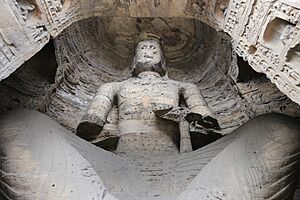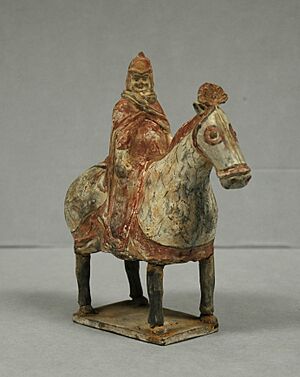Emperor Mingyuan of Northern Wei facts for kids
Quick facts for kids Emperor Mingyuan of Northern Wei北魏明元帝 |
|||||||||||||||||
|---|---|---|---|---|---|---|---|---|---|---|---|---|---|---|---|---|---|

Statue of Emperor Mingyuan at Yungang Grottoes
|
|||||||||||||||||
| Emperor of Northern Wei | |||||||||||||||||
| Reign | November 10, 409 – December 23, 423 | ||||||||||||||||
| Predecessor | Emperor Daowu | ||||||||||||||||
| Successor | Emperor Taiwu | ||||||||||||||||
| Born | 392 | ||||||||||||||||
| Died | December 24, 423 | ||||||||||||||||
| Burial | Jin Mausoleum of Yunzhong (雲中金陵) | ||||||||||||||||
| Consorts | Empress Zhao'ai Empress Mi |
||||||||||||||||
| Issue | Emperor Taiwu Tuoba Pi Tuoba Mi Tuoba Fan Tuoba Jian Tuoba Chong Tuoba Jun Princess Wuwei Princess Shiping Princess Longxi |
||||||||||||||||
|
|||||||||||||||||
| House | Tuoba | ||||||||||||||||
| Dynasty | Northern Wei | ||||||||||||||||
| Father | Emperor Daowu | ||||||||||||||||
| Mother | Empress Xuanmu | ||||||||||||||||
Emperor Mingyuan of Northern Wei (Chinese name Tuoba Si) was an important emperor of the Northern Wei dynasty in China. He was born in 392 and ruled from 409 to 423. His family, the Tuoba, were from the Xianbei people.
Emperor Mingyuan was the oldest son of Emperor Daowu, who founded the Northern Wei dynasty. While his father and later his son, Emperor Taiwu, expanded the empire a lot, Emperor Mingyuan focused on making the state strong and stable. He was known for listening to his officials' advice before making big decisions. Historians usually describe him as a smart and fair ruler.
Contents
Early Life of Tuoba Si
Tuoba Si was born in 392 in Yunzhong (modern-day Hohhot). His mother was Consort Liu, who was a favorite of his father, Emperor Daowu. Tuoba Si was the oldest son, and his father was very happy about his birth.
As Tuoba Si grew up, people said he was a kind and wise young man. He always acted properly. In contrast, his younger brother, Tuoba Shao, was often wild and got into trouble. Tuoba Si tried to help his brother, but this only made Tuoba Shao angry.
In 403, Tuoba Si was given the title of Prince of Qi. In 409, Emperor Daowu wanted to make Tuoba Si the next emperor, or crown prince. However, there was a tradition among the Tuoba people: when an heir was chosen, his mother had to die. This was to prevent the mother from having too much power over a young emperor. So, Emperor Daowu made Consort Liu take her own life.
Tuoba Si was very sad about his mother's death. When Emperor Daowu heard this, he called Tuoba Si back to the palace. Because Emperor Daowu had become very suspicious and violent in his later years, Tuoba Si's friends told him not to go. Tuoba Si agreed and hid in the countryside, away from the capital city of Pingcheng.
Meanwhile, Emperor Daowu had imprisoned Tuoba Shao's mother and planned to execute her. Tuoba Shao, trying to save his mother, killed Emperor Daowu. He then tried to become emperor himself. When Tuoba Si heard this, he secretly returned to Pingcheng and gathered supporters. The imperial guards soon sided with Tuoba Si. They arrested Tuoba Shao and brought him to Tuoba Si. Tuoba Si then executed Tuoba Shao and his mother. After this, Tuoba Si became the new emperor, known as Emperor Mingyuan.
Emperor Mingyuan's Early Rule
Unlike his father, who ruled alone, Emperor Mingyuan set up a special council of eight officials. Their job was to advise him on all important decisions. He wanted to hear different ideas before acting. This council included people from his own Xianbei tribe, as well as Han Chinese and other groups. This became a tradition for future emperors.
Emperor Mingyuan was much more forgiving than his father. However, he did not allow his advisors to do wrong. For example, in 413, one of his main advisors, Tuoba Qu, lost a big battle. Later, he did not do a good job as a governor. Emperor Mingyuan then had him executed.
In 410, Emperor Mingyuan sent his general, Baba Song, to fight the Rouran people. When Baba Song's army was surrounded, Emperor Mingyuan personally led his own army to rescue them. For several years, he often traveled away from the capital. He checked the defenses on the northern and eastern borders to protect his state from enemies like the Rouran and Northern Yan. He also sent armies to calm down rebellious tribes.
A history book from the 6th century, the Book of Wei, describes Emperor Mingyuan's rule like this: When Emperor Mingyuan became emperor, he brought back officials who had been dismissed. He helped people who were struggling. He ordered his officials to handle people's complaints and problems. The emperor was good at managing state matters, so officials became better at their jobs and made fewer mistakes.
Middle Years of His Reign
In 414, Emperor Mingyuan sent messengers to other states like Later Qin, Northern Yan, Jin, and Rouran. He wanted to make peace with them. His missions to Later Qin and Jin seemed to work well. However, his messenger to Northern Yan had a disagreement with their emperor, Feng Ba, and was held captive.
The mission to Rouran was harder to understand. At first, it seemed successful. But by 415, the Rouran leader, Yujiulü Datan, attacked. Emperor Mingyuan had to fight back and chased him away. When Emperor Mingyuan sent his general Daxi Jin to follow the Rouran, his soldiers faced terrible weather. Many suffered from frostbite. This started a pattern that lasted for a long time: Rouran would attack, Northern Wei would fight back, but they could not completely defeat the Rouran.
In late 414, Emperor Mingyuan began to learn from his official, Cui Hao. Cui Hao taught him about ancient texts like I Ching. Emperor Mingyuan often asked Cui Hao to make predictions based on these texts, and they often came true. Because of this, Cui Hao became very trusted by the emperor.
In 415, there was a big famine in the northern parts of Northern Wei. Emperor Mingyuan thought about moving the capital south. But Cui Hao and another official, Zhou Dan, advised against it. They believed moving south would show that the Xianbei people were fewer in number than the Han Chinese. So, the capital stayed in Pingcheng. Instead, many poor Xianbei people were moved to the Hebei region.
In the winter of 415, Emperor Mingyuan married Princess Xiping from the Later Qin state. He welcomed her like an empress. However, Tuoba customs said that only a consort who could make a gold statue with her own hands could be empress. Princess Xiping could not do this. So, Emperor Mingyuan made her an imperial consort, but he still honored her as if she were his empress within the palace.
In 416, a Jin general named Liu Yu launched a big attack on Later Qin. Part of Liu Yu's army came near Huatai, a Northern Wei outpost. The Northern Wei general there, Yuchi Jian, was scared and left Huatai. Emperor Mingyuan executed Yuchi for this. He then sent messages to Liu Yu, who said his target was Later Qin, not Northern Wei. He promised to return the city later. (However, Jin did not return Huatai, and Northern Wei did not have a strong presence south of the Yellow River again until 422.)
Jin forces quickly captured Later Qin's cities and moved towards their capital. In 417, the Later Qin emperor asked for help. Emperor Mingyuan's advisors debated whether to help Later Qin. Most thought they should try to stop Liu Yu. But Cui Hao said that doing so would make Northern Wei the target of Jin attacks. Emperor Mingyuan partly agreed. He still sent about 100,000 soldiers to guard the Yellow River. They were told to capture any Jin ships that drifted to their side. If Jin forces landed, they were to retreat and then return to their defensive positions when the Jin forces left. Liu Yu sent a general who defeated the Northern Wei forces on the northern bank. This ended Emperor Mingyuan's attempts to save Later Qin. Liu Yu captured the Later Qin capital and destroyed the state in 417. Many officials who opposed Liu Yu fled to Northern Wei. Emperor Mingyuan even offered rewards to anyone who could save members of the Later Qin royal family.
Later Years of His Reign
In 418, Emperor Mingyuan launched a big attack on Northern Yan. He surrounded their capital, Helong, but could not capture it and had to retreat.
In 420, Emperor Mingyuan's wife, Consort Yao, died. He honored her as an empress after her death.
In 422, Emperor Mingyuan became very ill, possibly from special medicines he was taking. He asked Cui Hao what he should do to prepare for the future. Cui Hao predicted he would get better. He also advised the emperor to make his 14-year-old son, Tuoba Tao, the crown prince. He suggested giving Tuoba Tao some power to lessen the emperor's own workload. Emperor Mingyuan agreed. He made Tuoba Tao crown prince and had him take the throne as a secondary emperor. He appointed his key advisors to help the Crown Prince. From then on, Crown Prince Tao handled most matters, especially domestic ones, while Emperor Mingyuan only dealt with the most important issues.
Later in 422, Emperor Mingyuan heard that Liu Yu had died. Liu Yu had become emperor of a new state called Liu Song. Emperor Mingyuan then ended relations with Liu Song. He told his council he planned to attack and capture three major cities south of the Yellow River from Liu Song: Luoyang, Hulao, and Huatai. He sent Daxi Jin to lead the attack.
Daxi first surrounded Huatai. When it didn't fall quickly, Emperor Mingyuan personally led an army south to help. He also had Crown Prince Tao lead an army to the northern border to guard against Rouran attacks. Huatai then fell. Daxi then moved towards Hulao and Luoyang. Meanwhile, Emperor Mingyuan also sent other generals east, who captured several areas in modern western Shandong. However, they could not capture the capital of Qing Province and had to retreat when food ran out and many soldiers got sick.
Northern Wei forces also struggled to capture Hulao, which was defended by a skilled Liu Song general. But they did capture Luoyang and Xuchang in 423. This cut off any Liu Song relief forces for Hulao. In the summer of 423, Hulao finally fell. The fighting stopped, and Northern Wei now controlled much of modern Henan and western Shandong.
In 423, Emperor Mingyuan also started a big building project. He began building a wall on the northern borders to defend against Rouran attacks.
In the winter of 423, Emperor Mingyuan died from his illness. Crown Prince Tao then became the new emperor, known as Emperor Taiwu.
Family
Emperor Mingyuan had several consorts and children:
- Empress Zhao'ai, from the Yao clan (died 420)
- Empress Mi, from the Du clan (died 420)
- Tuoba Dao, who became Emperor Taiwu (408–452), his first son.
- Furen, from the Murong clan
- Tuoba Pi, Prince Lepingli (died 444), his second son.
- Furen, from the Murong clan
- Tuoba Fan, Prince Le'anxuan (died 444), his fourth son.
- Furen, from the Yin clan
- Tuoba Jian, Prince Yongchangzhuang (died 441), his fifth son.
- Other children whose mothers are unknown:
- Tuoba Mi, Prince Andingshang (died 424)
- Tuoba Chong, Prince Jianningjing (died 453)
- Tuoba Jun, Duke Xinxing (died 441)
- Princess Wuwei
- Married Juqu Mujian, Prince Hexi (died 447) in 437. They had two daughters.
- Married Li Gai, Duke Nan in 447.
- Princess Shiping
- Married Helian Chang, Prince Qin (died 434) in 428.
- Princess Longxi
- Married Yao Hedou.
 | Lonnie Johnson |
 | Granville Woods |
 | Lewis Howard Latimer |
 | James West |


